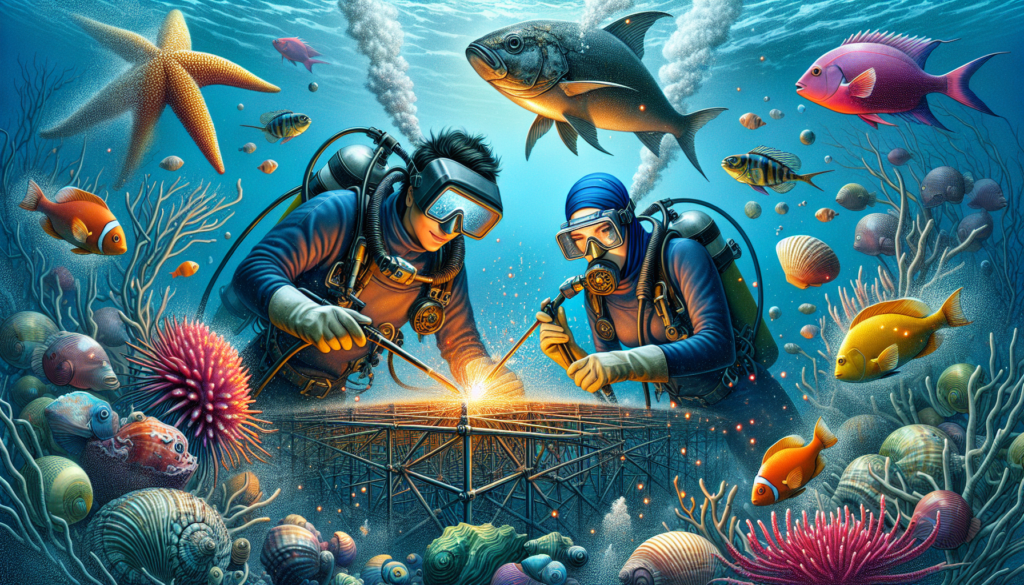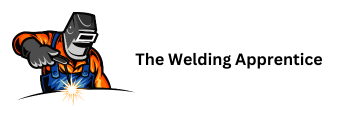Are you a welding enthusiast with a passion for exploration? If so, you’ll be thrilled to learn about the enticing world of underwater welding and the promising salaries it offers. The field of underwater welding is a unique and challenging profession that combines the skills of a welder with the daring nature of a deep-sea diver. In this article, we will explore the potential earnings of underwater welders and give you a glimpse into this captivating and well-paid career. So, grab your gear and prepare to dive into the exciting world of underwater welding salaries.

Overview
What is underwater welding?
Underwater welding is a specialized welding technique that involves performing welding tasks while submerged underwater. This unique field combines elements of both commercial diving and welding, requiring individuals to possess expertise in both areas. Underwater welders are responsible for maintaining and repairing structures and equipment located beneath the water’s surface, such as offshore oil and gas rigs, bridges, dams, and marine vessels. This demanding profession requires a high level of skill, as it involves working in challenging and often hazardous underwater environments.
Training and Certification
Diver Certification
Before becoming an underwater welder, obtaining a diver certification is essential. This certification ensures that individuals have the necessary skills and knowledge to work safely and effectively underwater. Diver certification courses typically cover topics such as diving physics, physiology, equipment operation, dive planning, and emergency procedures. It is crucial for aspiring underwater welders to complete a recognized diving training program from a reputable institution to gain the necessary qualifications and understanding of the unique challenges associated with working underwater.
Welding Certification
In addition to diver certification, underwater welders must also acquire welding certifications to demonstrate their proficiency in welding techniques. These certifications ensure that individuals possess the necessary skills to perform high-quality welding work in underwater environments. Common welding certifications include those provided by organizations such as the American Welding Society (AWS). Welding certification programs typically focus on various welding processes, such as shielded metal arc welding (SMAW) and flux-cored arc welding (FCAW), and cover topics such as welding safety, equipment operation, and welding techniques specific to underwater conditions.
Job Prospects
Demand for Underwater Welders
The demand for underwater welders remains consistently high due to the crucial role they play in maintaining and repairing underwater structures. Industries such as offshore oil and gas, marine construction, ship repair and salvage, and dam and bridge maintenance heavily rely on the expertise of underwater welders. As these industries continue to grow and expand, the need for skilled underwater welders is expected to increase. Therefore, individuals who pursue a career in underwater welding can expect to find numerous job opportunities both domestically and internationally.
Value of Experience
Experience is highly valued in the field of underwater welding. While formal education and certifications are necessary, it is the practical experience that truly sets underwater welders apart. Experienced welders have a higher level of expertise, problem-solving skills, and adaptability, making them more desirable to employers. Additionally, experienced underwater welders often have a larger network of industry connections, which can lead to more job opportunities and higher-paying positions. Therefore, gaining practical experience by working alongside experienced professionals and taking on challenging projects is vital to a successful and rewarding career in underwater welding.
Salary Factors
Depth of Work
One of the key factors that can influence the salary of an underwater welder is the depth at which they work. Welding at greater depths comes with increased challenges and risks, such as higher pressures, reduced visibility, and more demanding work conditions. As a result, welders who specialize in deep-sea welding or work at extreme depths can often command higher wages due to the specialized skills and level of physical endurance required for such tasks.
Type of Work
The specific type of work being performed can also impact the salary of an underwater welder. Certain types of underwater welding projects, such as commercial diving inspections or routine maintenance work, may not offer as high of a salary compared to more complex or specialized projects. Welders who specialize in intricate repair work, emergency repairs, or underwater structural construction may earn higher salaries due to the specialized nature of their tasks and the increased level of skill and expertise required.
Industry
The industry in which an underwater welder works can greatly affect their salary. Industries such as offshore oil and gas and marine construction typically offer higher salaries due to the demanding work environments and the high value of the structures being maintained. On the other hand, industries with lower demands for underwater welding services may offer lower salaries. It is important to consider the potential for job stability and advancement opportunities within different industries when evaluating salary prospects.
Location
Salary variations can also be influenced by the location in which an underwater welder is employed. Geographic factors such as regional cost of living, local demand for underwater welders, and proximity to major industrial centers can all impact salary levels. Areas with a high concentration of underwater welding projects, such as coastal regions or locations with a significant number of offshore oil and gas operations, may offer higher salaries to attract skilled welders. Conversely, areas with a lower demand for underwater welding services may offer lower salaries, although the cost of living may also be lower in these regions.

Average Salary
Global Average Salary
The average salary for underwater welders can vary greatly depending on a range of factors, including experience, certifications, industry, and location. On a global scale, the average salary for an underwater welder ranges from $40,000 to $100,000 per year. However, it is important to note that these figures are only estimations and can fluctuate based on market conditions and individual qualifications. As with any profession, factors such as skill level, reputation, and demand for services can significantly impact an individual’s earning potential.
Regional Differences
Salary ranges for underwater welders can also differ significantly depending on the location. For example, in countries like the United States, Australia, and Norway, where offshore oil and gas operations are prevalent, underwater welders can earn higher salaries due to the high demand for their specialized skills. Conversely, in countries with less maritime activity and fewer underwater welding projects, salaries may be lower. It is advisable for aspiring underwater welders to research the specific salary ranges in their desired region to gauge potential earnings accurately.
Employment Opportunities
Offshore Oil and Gas Industry
The offshore oil and gas industry offers a range of employment opportunities for underwater welders. As offshore platforms and pipelines require regular maintenance, repair, and inspection, skilled underwater welders play a vital role in ensuring the integrity and safety of these structures. The demand for underwater welders in this industry is expected to remain steady due to the ongoing need for exploration, production, and maintenance activities in offshore oil and gas fields worldwide.
Marine Construction
Underwater welders are also in high demand in the marine construction industry. They are responsible for constructing and repairing various marine structures, such as piers, docks, bridges, and underwater tunnels. Marine construction projects often involve working in challenging environments, including strong currents, limited visibility, and corrosive saltwater conditions. Skilled underwater welders who can navigate these challenges are essential for the successful completion of marine construction projects.
Ship Repair and Salvage
The ship repair and salvage industry provides another avenue for employment for underwater welders. Ships, vessels, and offshore platforms require regular maintenance, repair, and salvage operations, which often involve underwater welding tasks. Salvage operations, in particular, require the expertise of underwater welders to repair or patch damaged sections of vessels or structures. The ability to perform proficient underwater welding plays a crucial role in minimizing downtime and ensuring the safe operation of sea-going vessels.
Dams and Bridges
Underwater welding is also a crucial component of dam and bridge construction and maintenance. Dams and bridges are essential infrastructure that require regular inspections, repairs, and maintenance to ensure their structural integrity. Underwater welders are responsible for performing tasks such as anchor bolt repairs, structural reinforcements, and the installation of scour protection systems. These projects often require a high level of experience and expertise due to the technical nature of the work and the potential for challenging underwater conditions.
Safety Concerns
Hazards of Underwater Welding
Although underwater welding can be a rewarding profession, it is not without its share of hazards. The nature of working in an underwater environment poses unique risks and challenges that welders must be aware of. Some common hazards associated with underwater welding include exposure to high pressures, electrical shock, limited visibility, entanglement hazards, and the potential for underwater welding explosions due to gas build-up. Adequate training, strict adherence to safety procedures, and the use of appropriate personal protective equipment are essential to minimize these risks and protect the welfare of underwater welders.
Preventing Accidents
Preventing accidents and ensuring the safety of underwater welders requires a proactive approach. Employers play a crucial role in providing comprehensive training, enforcing safety protocols, and ensuring that all necessary safety equipment is provided and properly maintained. Underwater welders should prioritize their own safety by maintaining their certifications, regularly inspecting their equipment, and continuously updating their knowledge and skills to stay informed of the latest safety practices. It is also vital for underwater welders to work in teams, communicate effectively with their fellow divers, and follow established emergency procedures in the event of an incident.
Career Progression
Specialization
As underwater welders gain experience and expand their skill set, specializing in a specific area can open up new career opportunities and potentially lead to higher salaries. Specializations can include deep-sea welding, hyperbaric welding, or welding in specific industries such as offshore oil and gas or marine construction. By focusing on a particular niche, underwater welders can develop expertise in highly sought-after skills and become more competitive in the job market.
Becoming a Dive Supervisor
Another potential career progression for underwater welders is to become a dive supervisor. Dive supervisors are responsible for overseeing and coordinating diving operations, ensuring the safety and productivity of the dive team. To become a dive supervisor, additional training and certification are required. This role involves not only supervising underwater welding tasks but also managing dive plans, conducting risk assessments, and ensuring compliance with safety regulations. Becoming a dive supervisor can provide underwater welders with increased responsibilities, leadership opportunities, and potentially higher salaries.
Job Outlook
Future Demand
The future demand for underwater welders looks promising as various industries continue to rely on their specialized skills. The need for underwater welders is expected to remain steady, especially in industries such as offshore oil and gas, marine construction, and underwater infrastructure maintenance. As new offshore oil and gas fields are discovered and developed, a growing number of underwater welding projects will emerge. Additionally, aging infrastructure, such as bridges and dams, will require ongoing maintenance and repairs, creating a steady demand for skilled underwater welders.
Technological Advances
Technological advancements are also set to impact the job outlook for underwater welders. Innovations in equipment and diving technology are making it easier and safer for underwater welders to perform their tasks. Improved diving gear, underwater welding equipment, and remote-controlled welding systems are among the advancements that have the potential to enhance efficiency, increase safety, and broaden the scope of underwater welding projects. As technology continues to evolve, underwater welders who stay abreast of these advancements and adapt to new techniques will remain in high demand.
Conclusion
Underwater welding offers a unique and challenging career path for individuals with a passion for both diving and welding. With the right training, certifications, and experience, underwater welders can enjoy a fulfilling and financially rewarding profession. Job prospects for underwater welders are expected to remain strong, particularly in industries such as offshore oil and gas, marine construction, ship repair and salvage, and dam and bridge maintenance. However, it is essential for underwater welders to prioritize safety, continually improve their skills, and adapt to the latest technological advancements to thrive in this demanding field.
